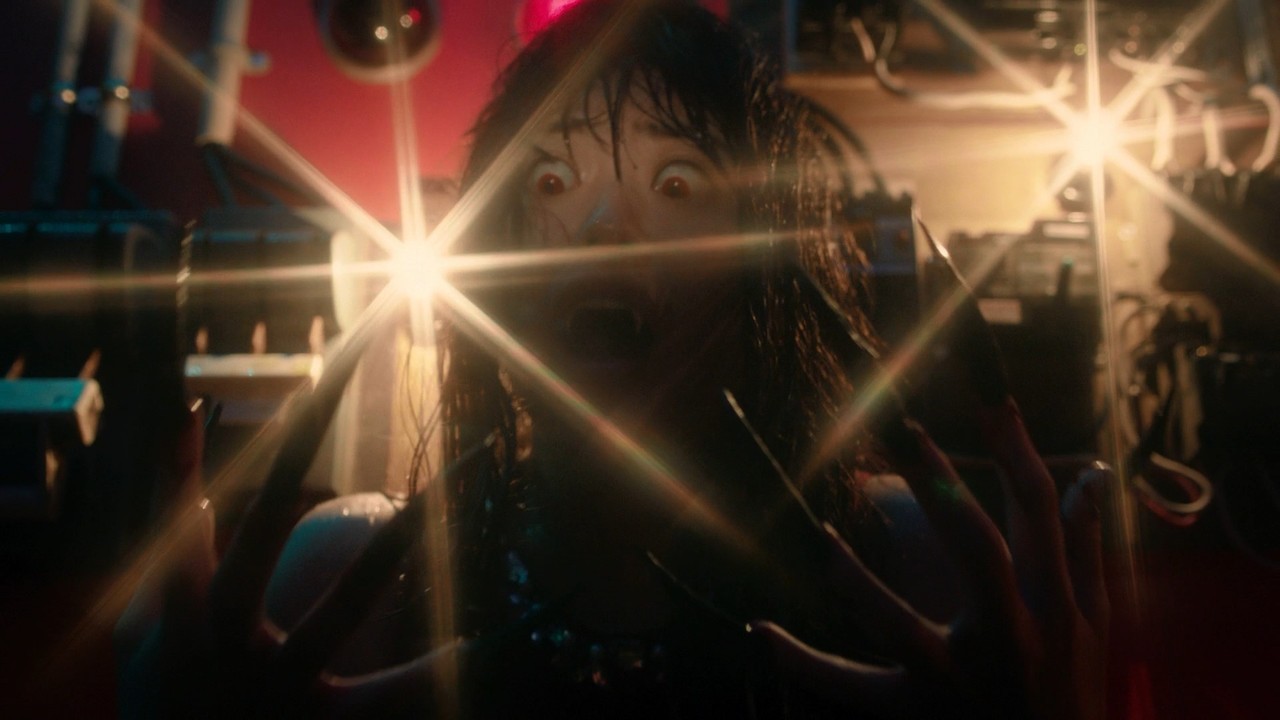Director: Sion Sono
Screenplay: Sion Sono
Cast: Ami Tomite as Manami; Yumi
Adachi as Empress; Megumi Kagurazaka as Elizabeth Báthory; Kaho as K; Shinnosuke
Mitsushima as Yamada; Akihiro Kitamura as Gen; Ayumu Yokuyama as Dre
 Synopsis: The last days of humanity are upon us, as a centuries old
conflict between two clans of vampires, the Dracula clan and the Corvin clan,
escalates when the Corvins plan to trap a small group of humans as their permanent,
cultivatable food source. In the midst of this is Manami (Ami Tomite), who finds herself pulled from ordinary human life when
she learns she has the blood of Dracula within herself.
Synopsis: The last days of humanity are upon us, as a centuries old
conflict between two clans of vampires, the Dracula clan and the Corvin clan,
escalates when the Corvins plan to trap a small group of humans as their permanent,
cultivatable food source. In the midst of this is Manami (Ami Tomite), who finds herself pulled from ordinary human life when
she learns she has the blood of Dracula within herself.
[Spoilers Ahead]
A great sense of excitement was
felt finally seeing Tokyo Vampire Hotel.
Also trepidation to be honest as, considering Sion Sono has had a spottier record from 2010 onwards, this
could've turned into a dud. It neither helps that, out of the gate, the first
episode of his Amazon Prime
commissioned mini-series is terrible. It set up all the worst aspects of Sono that have come up in his work over
the last few years, an abrupt jump into a world full of clichéd horror tropes
made worse by the sci-fi touches added. The grotesque violence Sono has in his films is here too and is
awful, problematic in how it gleefully delights in a woman in a Goth Lolita
dress entering a restaurant with firearms and killing the human beings with
relish after dealing with a group of vampires, the flippantness and "coolness"
off-putting in works like this even as someone who defends transgressive and
ero-guro tropes in art, boredom as well when she excessively stabs a person or
two with a fork over and over to death. Thankfully, blissfully, Tokyo Vampire Hotel is not this pilot
episode. It's still excessively gory, and gets more over-the-top in the amount
of fake blood spilt, but it also returns to the type of films I liked by Sono in Strange Circus (2005) or Suicide
Club (2001), strange tales with tangents where genre tropes get mangled in
weird and fascinating ways.
 |
| From https://m.media-amazon.com/images/M/MV5BZDUwYTFhMDItMWM2Ny 00Y2FiLTk4ZmUtM2E5NTYyNGRjMDIzXkEyXkFqcGdeQXVyNjY5NTM5MjA@._V1_.jpg |
It helps this is a mini-series. I
have no idea what the feature length version, which cuts this ten episode series
down to 142 minitues (!) would be like, but the mini-series as a whole feels
less like the stereotype of cult content that is sold to Western viewers but
closer to the sincerer Japanese genre films, ironic considering this was
sponsored for Western viewers, but probably influenced by the length of the
material, forcing Sono's hand in having to have more than the
gore on display. At least from episode two onwards the series already gets
interesting, skipping years earlier to a human girl given the blood of Dracula
being raised in an adoptive family, specifically losers chosen by a literal
neighbourhood of vampires to take care of her or they got quickly replaced with
other foster parents. From there, weaving the life of Manimi, cursed to been
changed by her vampire's blood on her 22nd birthday, and the conflict between
the Dracula and Corvin clans, it used its length to expand to include more side
characters and events. It can intercut the action and gore with more
personality building dialogue scenes, drama which was found in the likes of Suicide Club and made Sono's films stand out as much as his
lurid and bizarre set pieces.
The material itself is generic on
the surface, vampires versus vampires with a special "one" figure in the
centre. Unleashed onto an unsuspecting Amazon
Prime viewership this would be weird by itself, especially as Sono now is decorating his films in bold
primary colours post-Antiporno (2016),
appearing especially for the main building the film is set in, the titular
hotel which is actually the lower half of one of the Corvin vampire elders, her
children feeding her through a hole in herself what cannot help but come off with
vaguely sexual in connotations. What I was glad for however is that, lost in
his films over the last few years but flourishing here again, is his
eccentricity which is fed by the longer template for the storytelling. The
actual plot - that the Corvin clan have humans trapped, pretending a nuclear
winter has taken place outside to force them to copulate and breed as their
cattle - is merely a backdrop for all these characters, even the villains, to
have quirks and issues to deal with. Little touches, like the announcer at the
Corvin's lair being way too enthusiastic as he order humans to procreate, or
the fact he can still have moments of actual seriousness in-between, mean a lot
more when in the last few films I've seen he's not been able to balance
seriousness and humour properly as he could in epics like Love Exposure (2008). That this is a major step for Sion Sono in terms of the mainstream
spotlight was likely a factor as, befitting the material, he convinced Amazon Prime to let the production shot
in Romania too which proved to be in favour of the film, the use of real
castles and the Salina Turda salt mine proving worthy production design without
much hassle.
| From http://altyazi.org/wp-content/uploads /2017/06/tokyo-vampire-hotel-2017-7.jpg |
The series could've been fewer episodes actually, as the middle episodes can lag at points or repeating events like the humans trying to escape the hotel multiple times, but the size of the cast allows interesting factors to come into play nonetheless. That even the villains have sympathies is successful even if it's a few more character details rather than in-depth - one of the main Corvin clan members, Yamada (Shinnosuke Mitsushima), was given by his father to the clan in exchange for a political career where he becomes president of Japan in the current time period, enforcing a hatred of life only softened by his romance with Elizabeth Báthory (Megumi Kagurazaka, Sono's wife and argubly muse). In contrast, the Dracula clan and others have an amorality which, despite my issues within the first episode, plays to interesting dynamics, such as with K (Kaho), a Dracula clan member with both sympathy but also utterly ruthless, making her relationship with Manami, the figure stuck with horrifying abilities about to grow on her twenty second birthday, more complicated. There's also humour, as in the case of Báthory's "mother", depicted rarely with the actress in normal form, but either as a head inside a practical effect or a shrunken stop motion not as tall as a doll's house. Even the whole factor of one of Corvin clan being the actual hotel is played with a legitimately (but well executed) spectacle in between her walls, witnessing the humans fed into her in a never ending orgy of stabbing and smearing blood on themselves that, barring one change in the lighting style, would be if you let Gasper Noe direct the Dante's Inferno.
The moment Tokyo Vampire Hotel fully succeeds however is when, out of ten
episodes, episode seven has the actual climatic battle, most of the episode a
bloody spectacle where almost every major figure dies at the end. The last
three, less than thirty minutes each, leave survivors both of the human and
vampire sides awkwardly picking up the pieces of their lives in the hotel,
without masters and eventually eating at the makeshift restaurant in the centre
hall with a comradery of friendship, staying locked in the hotel as their whole
world. Even if there is still insidious plans afoot, these last three episodes
are why I eventually liked the whole mini-series entirely, building upon
characters (the tragic victim of circumstance in Manami, a new character who is
the only teenager among adults who questions her environment) to a chamber
piece which adds a great deal. Including a pitch perfect end twist which is hilarious,
where the least expected people barge through a door, looking like an actual
pair of old men than police officers, and an ending which dabbles in the
metaphorical in a way that was completely perfect. This conclusion was exactly the
right way to end Tokyo Vampire Hotel,
and proved a relief having found myself disillusioned in terms of the quality
of Sion Sono's recent output. This mini-series,
probably the work more will see over others, has proven then successful for his
reputation and for individuals like myself who yearned for those older titles
in his filmography.
 |
| From https://66.media.tumblr.com/11fd99fcc671bed50edb5 787069c15f4/tumblr_p7tmcrcMFW1rw93m3o6_1280.jpg |

No comments:
Post a Comment